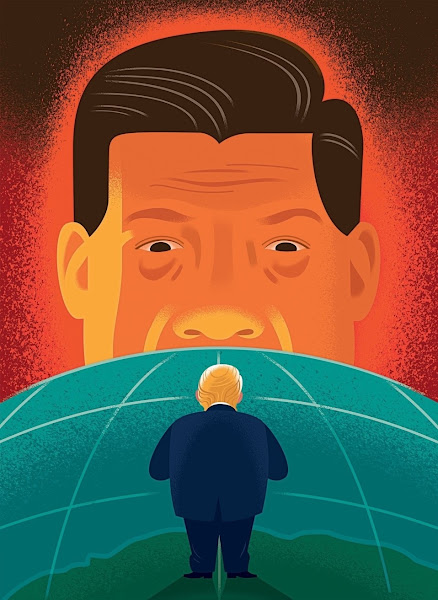So far, Trump has proposed reducing U.S. contributions to the U.N. by forty per cent, and pressured the General Assembly to cut six hundred million dollars from its peacekeeping budget. In his first speech to the U.N., in September, Trump ignored its collective spirit and celebrated sovereignty above all, saying,
As President of the United States, I will always put America first, just like you, as the leaders of your countries, will always and should always put your countries first.China’s approach is more ambitious. In recent years, it has taken steps to accrue national power on a scale that no country has attempted since the Cold War, by increasing its investments in the types of assets that established American authority in the previous century: foreign aid, overseas security, foreign influence, and the most advanced new technologies, such as artificial intelligence. It has become one of the leading contributors to the U.N.’s budget and to its peacekeeping force, and it has joined talks to address global problems such as terrorism, piracy, and nuclear proliferation.
And China has embarked on history’s most expensive foreign infrastructure plan. Under the Belt and Road Initiative, it is building bridges, railways, and ports in Asia, Africa, and beyond. If the initiative’s cost reaches a trillion dollars, as predicted, it will be more than seven times that of the Marshall Plan, which the U.S. launched in 1947, spending a hundred and thirty billion, in today’s dollars, on rebuilding postwar Europe.
Evan Osnos
Despite the title, this article is as much about China’s ambitions to become a world power, as it is about America’s recent reluctance to fill this role. Very interesting read, covering multiple topics, from political influence to economic investments to tech advancements and artificial intelligence.

Barack Obama’s foreign policy was characterized as leading from behind. Trump’s doctrine may come to be understood as retreating from the front.
China’s leaders rarely air their views about an American President, but well-connected scholars—the ranking instituteniks of Beijing and Shanghai and Guangzhou—can map the contours of their assessments. Yan Xuetong is the dean of Tsinghua University’s Institute of Modern International Relations. At sixty-five, Yan is bouncy and trim, with short silver hair and a roaring laugh. When I arrived at his office one evening, he donned a black wool cap and coat, and we set off into the cold. Before I could ask a question, he said,
I think Trump is America’s Gorbachev. In China, Mikhail Gorbachev is known as the leader who led an empire to collapse.The United States will suffer, he warned.
Russel spoke to Chinese officials after the Mar-a-Lago visit.
The Chinese felt like they had Trump’s number, he said.Yes, there is this random, unpredictable Ouija-board quality to him that worries them, and they have to brace for some problems, but, fundamentally, what they said wasHe’s a paper tiger. Because he hasn’t delivered on any of his threats. There’s no wall on Mexico. There’s no repeal of health care. He can’t get the Congress to back him up. He’s under investigation.
Post a Comment